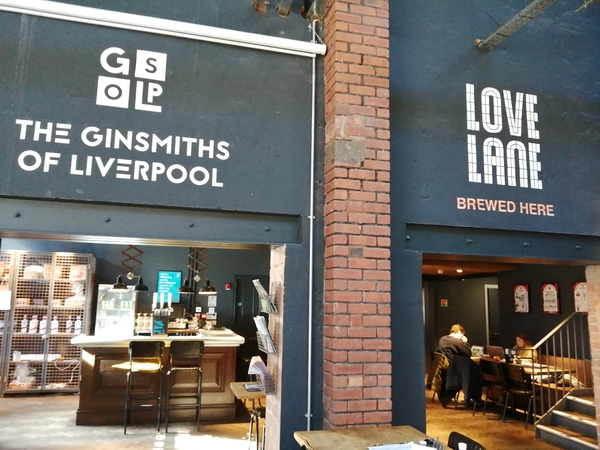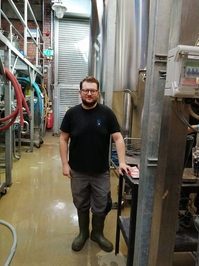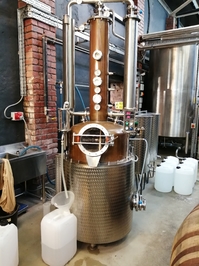Liverpool gets a love in at Love Lane
Added: Friday, June 26th 2020


You need a large dose of chutzpah to call your brewery and tap room Love Lane after a former red light district but this is Liverpool where humour and boldness – as well as football -- rule the roost.
Steve Crawley (left) first thought of calling his operation the Liverpool Craft Beer Company but, when he found suitable premises in the Baltic Triangle district and learned about its history, Love Lane was too good to turn down.
The name stems from the time when the city was one of the biggest ports in the world. As the Baltic Triangle suggests, ships went far and wide from Liverpool, down the mighty Mersey to the sea.
Incoming boats brought with them sailors looking for – to put it delicately – entertainment and the Baltic Triangle offered brothels as well as bars.
That’s all in the past. The Love Lane Taproom serves food and drink with the upstairs rooms reserved for wedding receptions and business meetings rather than slap and tickle. The spacious ground floor has tables and benches for drinking and eating, with views of the brew house through a glass partition.
Love Lane is based in -- would you believe it -- a former rubber factory. It was bombed during World War Two and stood derelict for years. Steve Crawley bought the lease in 2016 and opened in December 2017 after long months of rebuilding and installing brewing kit capable of producing 18,000 hectolitres a year.
Steve admits his family didn’t see much of him in the early years but Love Lane is now doing good business, its main brand Pale Ale widely available throughout Merseyside. The Taproom has become one of the coolest places in the city for mainly younger drinkers due to the fact, Steve says, that Love Lane has the “wow factor”.
He has 25 years’ experience of brewing and retailing. He was the managing director of the Caledonian Brewery in Edinburgh where he turned Deuchar’s IPA into a national brand. He left “the Caley” when it was bought by Heineken, he was involved with the Harviestoun Brewery for a while but returned to his home base on the Wirral to start brewing in Liverpool.
His original plan was to buy and re-launch Higson’s Bitter, a much-loved Liverpool beer that disappeared when the brewery, which dated from 1780, was bought and closed by the national brewing giant Whitbread in 1990.
There have been several attempts to resurrect the beer that all failed after a short time. Steve was able to buy the rights to the name Higson’s but ran into a major problem: time had passed Higson’s by.
“You’ve got to be over 50 to remember Higson’s,” Steve says. “The brewery’s got a fascinating history but Love Lane resonates with younger drinkers and brown beers don’t sell in most parts of Liverpool.
“We started out as Higson’s Brewery but we knew it wasn’t right and we switched to Love Lane. We sell Higson’s Bitter at the Taproom and in a few select outlets but I haven’t got a budget to boost the brand. Cask beer is sold so cheap in Liverpool that it’s hard to make money from it.”
Steve says the likes of Camden Town and Beavertown have refashioned the beer scene in the south, but Liverpool hadn’t had a craft beer revolution. But there are two million people living in the Merseyside region and Love Lane is determined to cater to that enormous potential. Steve says the success of Liverpool Football Club brings a large number of visitors to the city.
The main beer is Love Lane Pale Ale (4.5 per cent) and it accounts for 65 per cent of sales and production. Its outlets include the bar in the world-famous Liver Building and the Hilton Hotel.
“We needed a strong brand and Pale Ale is now widely available in Liverpool,” Steve says. “We had to make craft keg as well as cask.”

The brewery was built with the help of funds from the Enterprise Investment Scheme. The original brewing kit – now much expanded – came from a small brewery in Dorset. 3,300 hectos were produced in 2019 and there were plans to grow that figure in 2020 until the pandemic arrived.
But while the Taproom had to close during lockdown and there were no pubs to supply, the brewery sold packaged beers online from its craft beer shop. Cans are 440ml, a size that big brewers can’t handle, according to Steve.
Head brewer Jack Jones (above) is a bio-chemist and came from the Atom Brewery in Hull, making the journey from one great sea port on the east coast to another on the west coast. He has added some 50,000 litre tanks and a cold store for lager. He’s installed a hop rocket, a device also used by Robinson’s in Stockport and Westerham in Kent: ales circulate over a bed of hops inside the vessel following fermentation to pick up additional aroma and bitterness.
Jack has also added an 80-litre pilot plant, where he can trial new brews and produce monthly specials. Malt whisky and sherry casks are also used to age beers in wood: an Imperial Porter is being aged in Glenfarclas whisky casks and should be available later this year.
The hop store emphasises the fact that Jack Jones brews beer rich in taste and aroma. There are varieties from the U.S., England, New Zealand and Germany, with Tettnanger, Hersbrucker and Mandarina used in a 4.4% Lager.
The craft beer range includes a Session IPA (4.1 per cent), Red Rye (4.4 per cent), New England IPA (5 per cent), Mango IPA (5.2 per cent) and – as befits the area -- Baltic Porter (6 per cent).
Higson’s has not been sidelined. As well as the main Bitter (3.9 per cent) there’s a now range that includes Higson’s American Pale Ale (4.3 per cent), American Red (3.9 per cent) and Porter (4.5 per cent).
Love Lane also reaches out a young audience with gins from a distillery in the brewhouse: the Taproom has a duel name of Love Lane and Ginsmiths of Liverpool. The varieties include Dry & Pink, marshmallow root, Merchant Navy Strength, vanilla and pepper, and pomegranate.
There’s a strong emphasis on food at the Taproom. Chef
Graham Holden offers halloumi bites, honey-glazed chipolatas, Pale Ale Rarebit, Caesar salad (chicken or vegetarian), Goan curry, pork sausage and creamy mash, Love Lane salted haddock, and Love Lane burger and plant-based burger, along with beer boards, ploughman’s and artisan cheese boards.

Beers at the Taproom cost between £4.50 and £5.50 a pint – that’s high end for Liverpool but Steve Crawley is reaching out to a new, younger and better-heeled clientele –he’s already linked up with up the local LGBT groups.
Higson’s may be old hat but it’s good to have the name back on the bar and Liverpudlians, proud of their history and heritage, may not dismiss the beers as fit only for older Scousers.
And I fancy the reopened Taproom will be packed by locals of all ages in red shirts, celebrating a great football triumph.
•Love Lane Brewery, 62-64 Bridgewater Street, Baltic Triangle, Liverpool L1 0AY. 0151 306 6466. www.lovelanebrewing.com






